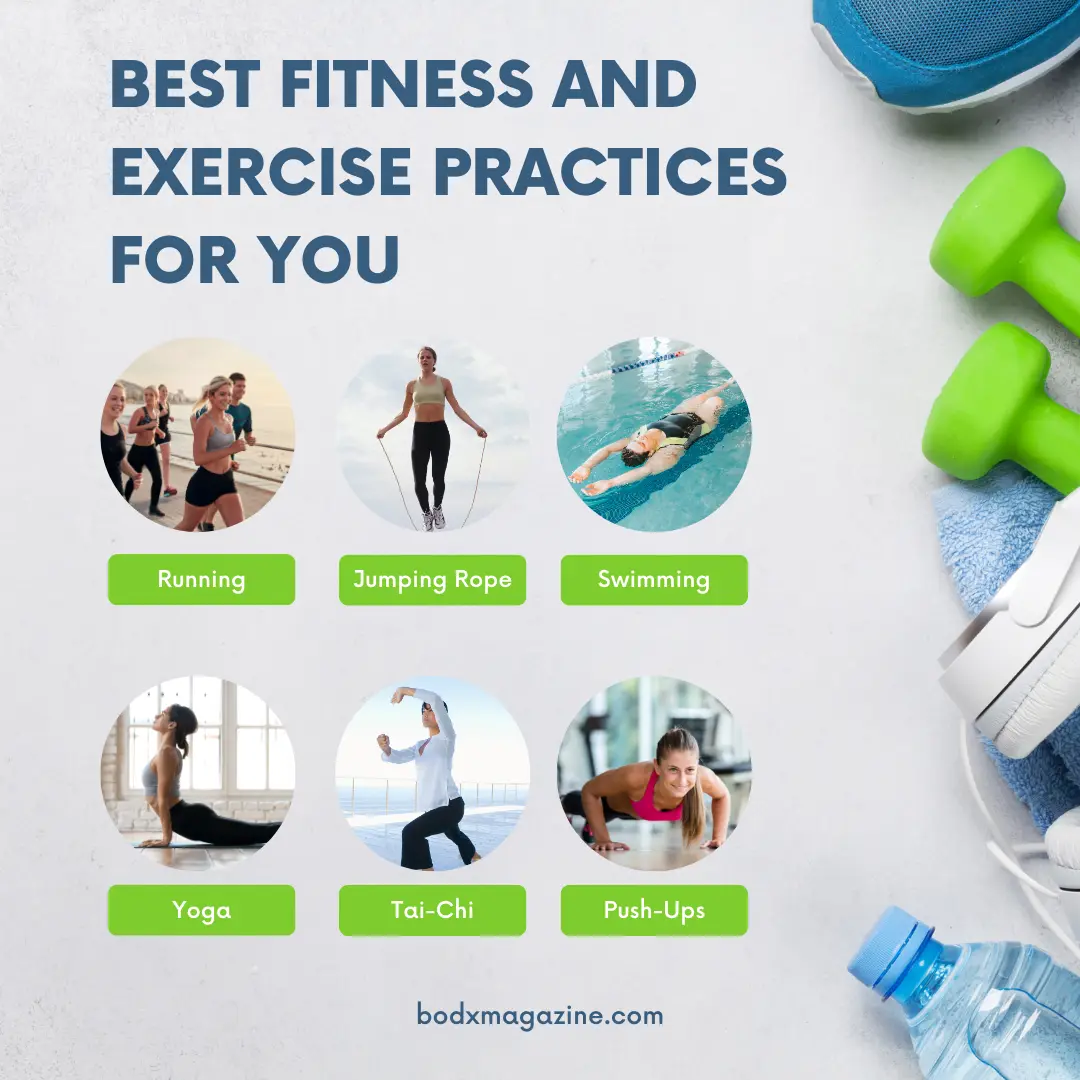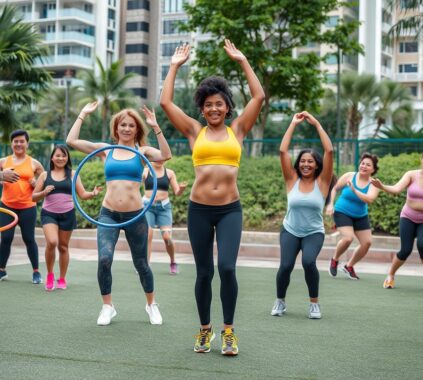In today’s fast-paced world, maintaining a healthy lifestyle is more important than ever. With countless fitness trends and exercise routines available, it can be overwhelming to determine which practices are best suited for you. In this comprehensive guide, we will explore the most effective fitness and exercise practices to help you achieve your health and wellness goals. Whether you’re a beginner or a seasoned athlete, this article will provide valuable insights to enhance your fitness journey.
Understanding Your Fitness Goals
Setting Realistic Goals
Before embarking on any fitness journey, it’s crucial to set realistic and achievable goals. Identify what you want to accomplish—whether it’s losing weight, building muscle, improving cardiovascular health, or enhancing overall well-being. Setting specific, measurable, attainable, relevant, and time-bound (SMART) goals will keep you motivated and focused.
Assessing Your Current Fitness Level
Understanding your current fitness level is essential for creating a personalized exercise plan. Conduct a fitness assessment that includes measuring your body composition, strength, endurance, flexibility, and cardiovascular health. This assessment will serve as a baseline to track your progress and adjust your routine as needed.
Creating a Balanced Exercise Routine
Incorporating Cardiovascular Exercises
Cardiovascular exercises are vital for improving heart health, burning calories, and increasing stamina. Incorporate activities such as running, cycling, swimming, or brisk walking into your routine. Aim for at least 150 minutes of moderate-intensity or 75 minutes of high-intensity cardio per week.
Benefits of Cardiovascular Exercises
- Improved Heart Health: Regular cardio strengthens the heart and reduces the risk of cardiovascular diseases.
- Weight Management: Cardio helps burn calories and supports weight loss or maintenance.
- Enhanced Mood: Physical activity releases endorphins, which can improve mood and reduce stress.
Strength Training for Muscle Building
Strength training is essential for building and maintaining muscle mass, improving bone density, and boosting metabolism. Incorporate exercises such as weightlifting, resistance band workouts, or bodyweight exercises like push-ups and squats. Aim for at least two days of strength training per week, targeting all major muscle groups.
Benefits of Strength Training
- Increased Muscle Mass: Strength training promotes muscle growth and strength.
- Improved Metabolism: More muscle mass leads to a higher resting metabolic rate, aiding in weight management.
- Bone Health: Weight-bearing exercises enhance bone density and reduce the risk of osteoporosis.
Flexibility and Mobility Exercises
Flexibility and mobility exercises are crucial for maintaining a full range of motion in your joints and preventing injuries. Incorporate stretching, yoga, or Pilates into your routine to improve flexibility and mobility. Aim for at least two to three sessions per week.
Benefits of Flexibility and Mobility Exercises
- Injury Prevention: Improved flexibility reduces the risk of strains and sprains.
- Enhanced Performance: Greater mobility allows for better performance in other exercises.
- Reduced Muscle Tension: Stretching helps alleviate muscle tightness and soreness.
Nutrition and Hydration for Optimal Performance
Balanced Diet for Fitness
A balanced diet is essential for fueling your workouts and aiding recovery. Consume a variety of nutrient-dense foods including lean proteins, whole grains, fruits, vegetables, and healthy fats. Ensure you’re getting the right balance of macronutrients (carbohydrates, proteins, and fats) to support your fitness goals.
Key Nutrients for Fitness
- Proteins: Essential for muscle repair and growth. Include sources like chicken, fish, beans, and tofu.
- Carbohydrates: Provide energy for workouts. Opt for complex carbs like whole grains, fruits, and vegetables.
- Fats: Support hormone production and overall health. Include healthy fats from avocados, nuts, and olive oil.
Importance of Hydration
Staying hydrated is crucial for optimal performance and recovery. Drink plenty of water throughout the day, especially before, during, and after workouts. Dehydration can lead to decreased performance, muscle cramps, and fatigue.
Hydration Tips
- Drink Water Regularly: Aim for at least 8-10 glasses of water per day.
- Monitor Your Urine: Light yellow urine indicates proper hydration.
- Include Electrolytes: For intense workouts, consider drinks with electrolytes to replenish lost minerals.
Rest and Recovery
Importance of Rest Days
Rest and recovery are just as important as exercise itself. Incorporate rest days into your routine to allow your muscles to repair and grow. Overtraining can lead to injuries and burnout, so listen to your body and give it the rest it needs.
Benefits of Rest Days
- Muscle Recovery: Rest allows muscles to repair and grow stronger.
- Injury Prevention: Reduces the risk of overuse injuries.
- Mental Health: Provides a mental break and reduces stress.
Effective Recovery Techniques
In addition to rest days, incorporate recovery techniques such as foam rolling, stretching, and massage to enhance recovery. These practices can help reduce muscle soreness and improve flexibility.
Popular Recovery Techniques
- Foam Rolling: Helps release muscle tension and improve blood flow.
- Stretching: Alleviates muscle tightness and enhances flexibility.
- Massage Therapy: Reduces muscle soreness and promotes relaxation.
Staying Motivated and Consistent
Finding Enjoyable Activities
One of the keys to staying motivated is finding activities you enjoy. Experiment with different types of exercises to discover what you love. Whether it’s dancing, hiking, or playing a sport, enjoying your workouts will make it easier to stay consistent.
Tracking Your Progress
Tracking your progress is essential for staying motivated and making adjustments to your routine. Keep a fitness journal or use a fitness app to log your workouts, track your goals, and celebrate your achievements.
Benefits of Tracking Progress
- Accountability: Helps you stay accountable to your goals.
- Motivation: Seeing progress can boost motivation and confidence.
- Adjustments: Allows you to make informed adjustments to your routine.
Setting New Challenges
To keep things interesting and prevent plateaus, set new challenges and goals regularly. Whether it’s running a marathon, lifting heavier weights, or mastering a new yoga pose, new challenges will keep you engaged and motivated.
Conclusion
Achieving your fitness goals requires a balanced approach that includes cardiovascular exercises, strength training, flexibility and mobility exercises, proper nutrition, hydration, rest, and recovery. By setting realistic goals, understanding your current fitness level, and staying motivated, you can create a personalized fitness routine that works for you. Remember, consistency is key, and finding activities you enjoy will make your fitness journey more enjoyable and sustainable.
FAQs
1. How often should I work out each week?
Aim for at least 150 minutes of moderate-intensity cardio and two days of strength training per week.
2. What is the best time of day to exercise?
The best time to exercise is when you feel most energetic and can be consistent, whether it’s morning, afternoon, or evening.
3. How can I stay motivated to work out regularly?
Find activities you enjoy, set realistic goals, track your progress, and mix up your routine to keep things interesting.
4. What should I eat before and after a workout?
Before a workout, eat a balanced meal with carbs and protein. After a workout, consume protein and carbs to aid recovery.
5. How important is sleep for fitness?
Sleep is crucial for muscle recovery, mental health, and overall performance. Aim for 7-9 hours of quality sleep per night.
6. Can I lose weight with just exercise?
While exercise is important, a balanced diet is also crucial for weight loss. Combine both for the best results.
7. How do I prevent injuries during exercise?
Warm up before workouts, use proper form, and incorporate rest days to prevent injuries.
8. What are the benefits of group fitness classes?
Group fitness classes provide motivation, social interaction, and structured workouts led by instructors.
9. How can I improve my flexibility?
Incorporate stretching, yoga, or Pilates into your routine and practice regularly to improve flexibility.
10. Is it necessary to take supplements for fitness?
Supplements are not necessary for everyone. Focus on a balanced diet first, and consult a healthcare professional if considering supplements.


















